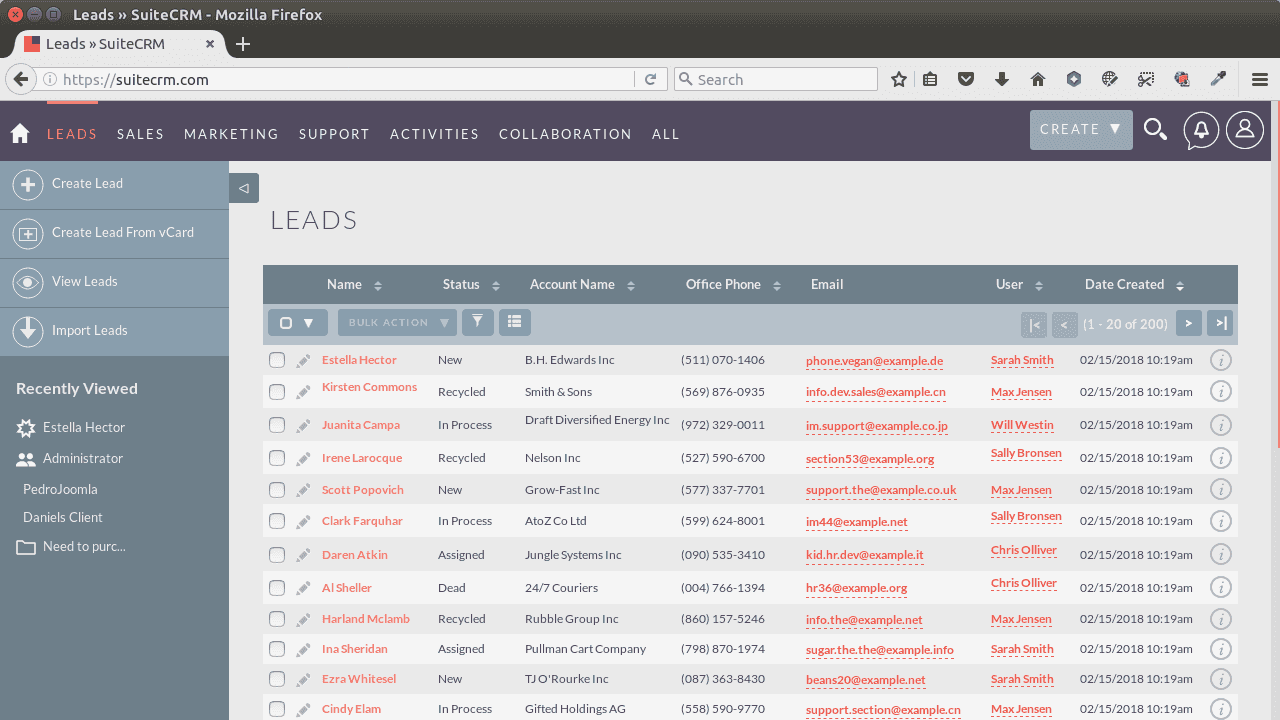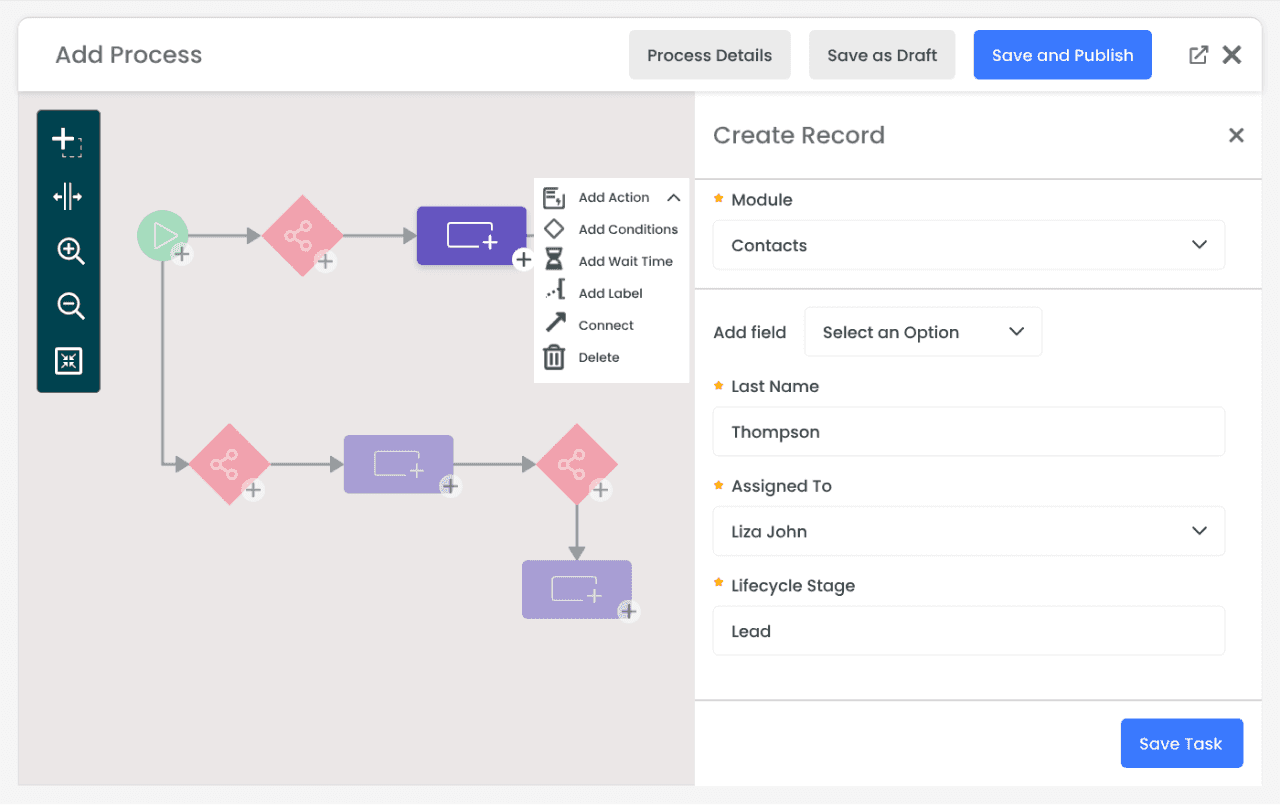
Hosted CRM: features, best platforms & selection guidelines
December 9, 2025
- Home
- CRM services
- Hosted CRM

by Anton Dynov,
Senior Salesforce Developer
Hosted CRM is customer relationship management software hosted remotely by the solution’s vendor or third-party hosting providers and accessed by users through the internet. Most of these solutions are cloud-based CRM platforms licensed under the SaaS model.
Itransition provides end-to-end implementation services to help companies adopt hosted CRM software and support their marketing, sales, and customer support operations while ensuring lower upfront costs and minimal maintenance efforts.
Hosted CRM vs on-premises CRM
Since SaaS is the most common delivery model for hosted CRM solutions, we will be referring to SaaS for the sake of brevity when discussing hosted CRM’s technical attributes and the responsibilities of users and providers.
Hosted CRM
On-premises CRM
Deployment
Deployment
Hosted by the provider on remote servers
Installed on your company’s local servers
Uptime & access
Uptime & access
Near 100% uptime and access from any device with an internet connection
High levels of uptime and access only via devices in the company’s network
Maintenance & updates
Maintenance & updates
Included in the platform subscription and managed by the vendor
Handled by your in-house team or external specialists
Scalability
Scalability
Easily scalable by purchasing additional licenses and more comprehensive plans
Depends on the organization’s IT infrastructure
Security
Security
Security management mostly handled by the vendor, but lack of direct control can be concerning for some companies
The solution’s security is the full responsibility of your IT specialists
TCO
TCO
Initial costs for implementation and regular licensing fees
Substantial upfront costs for the implementation and regular maintenance expenses
Searching for a CRM implementation partner?
Business benefits of hosted CRM adoption
Lower upfront costs
Companies can adopt hosted CRM without major investments required to host an on-premises solution.
Ease of access & collaboration
Users can access hosted CRM at any time and from anywhere via the internet. This facilitates collaboration across geographically distributed teams, including field service specialists and sales reps working remotely.
Pre-purchase test-drive
Most hosted CRM vendors offer a free trial. While this period is usually too short to fully understand the system’s pros and cons, a company can still assess the solution’s user-friendliness and functional scope and decide whether the platform is the optimal choice.
Managed upgrades & maintenance
Hosted CRM providers take care of software maintenance, data backups, and updates, relieving adopters of this burden and enabling them to access the latest features as soon as they’re released.
Superior scalability
Rather than purchasing additional hardware to accommodate an on-premises CRM's growing user base, hosted CRM adopters can easily scale up and down their licenses and plans and get the storage and computing resources they need.
Focus on security & compliance
Given the common security concerns of storing data in a public cloud, hosted CRM vendors make an extra effort to equip their solutions with robust data security features, deal with security issues, and comply with data management regulations like the GDPR.
Key hosted CRM features
Marketing
- Marketing automation
to automate tasks like lead information capture and social media posting
- Campaign management
to orchestrate multi-channel marketing campaigns
- Personalized marketing
to segment leads and target them with tailored web content and messages for increased conversions
- Lead scoring
based on engagement to prioritize high-value leads
Sales
- Contact management
to gather customer data (personal details, customer interactions, etc.) into unified profiles
- Sales pipeline management
to plan sales activities and track leads progressing through the sales funnel
- Sales automation
to automate follow-ups, quoting, and other sales tasks
- Multi-channel customer communication
including IP telephony and email integration
- Sales monitoring & forecasting
to track KPIs and optimize your sales strategies based on the performance
Customer service
- Case management
to gather customer cases, distribute them to support agents, and escalate high-priority ones
- Self-service portals & chatbots
to provide customers with information and support 24/7
- Field service management
to help schedule and execute on-site operations (maintenance, repair, etc.)
Best proprietary options for hosted CRM
The most popular hosted CRM providers deliver their solutions via the cloud on a subscription basis (SaaS or Software as a service). Some of them, however, offer both cloud-hosted and on-premises deployment.
As the undisputed CRM market leader for over a decade, Salesforce offers an impressive range of generic customer relationship management products along with an extensive selection of industry-oriented solutions for companies from specific verticals.
Key strengths & capabilities
- Marketing automation capabilities, including automated lead segmentation and triggered messages and surveys
- Email marketing, web content, and in-app messages personalization based on customer information
- Sales engagement functionality, such as lead ranking and prioritization and automated follow-ups
- Salesforce automation to set up automated sales workflows, including account management, quoting, and contract management
- Sales pipeline progress tracking through real-time deal alerts and opportunity monitoring via sales dashboards
- Revenue lifecycle management features like CPQ tools, app/website shopping cart syncing, and payment collection through integrated or Salesforce's native payment gateways
- Analytics features to forecast sales, identify new opportunities, and monitor sales team performance
Customer service chatbots powered by Einstein AI and self-service help centers for 24/7 client assistance
- AppExchange app marketplace offering free and paid extension packages to complement standard Salesforce functionality
Limitations
- Pricey modular licensing and a steep learning curve
Deployment
- Hosted only
Pricing
- Multiple tiered plans for each product (“Cloud” in Salesforce terminology)
- Plans starting at $25/user/month
- Billed annually, except for certain starter plans (monthly or annually)
- 30-day free trial
Unlike traditional CRM platforms focusing on customer-oriented operations, Dynamics 365 complements its marketing, sales, and service functionality with broader ERP capabilities like accounting, HR management, and project management.
Key strengths & capabilities
- Transactional, demographic, and behavioral data analysis to segment customers and create individual profile summaries
- Сustomer journeys personalization with content and messages adjusted in real time based on personal data
- Sales pipeline management capabilities, including sales task tracking via AI-generated updates
- Lead and opportunity ranking and prioritization by AI-powered scoring models
- Generative AI to create opportunity summaries, email drafts, meeting preparation notes, and other documents
- Sales forecasting capabilities to predict revenue and track performance against predefined goals
- AI-based case management capabilities, including smart case routing, customer response generation, and knowledge article recommendations
- Self-service customer support features like chatbots, interactive voice responses, and community portals
- Ecommerce-oriented CRM tools to build storefronts featuring product recommendation engines and embedded chatbots
Limitations
- Complex licensing model and integration issues with third-party applications
Deployment
- Hosted or on-premises
Pricing
- Multiple plans for each product (Marketing, Sales, Service, etc.)
- Licensing guide available on the Microsoft website
- Billed monthly
- 30-day free trial
Hubspot is a popular comprehensive CRM platform offering advanced automation and data analytics capabilities to streamline your marketing, sales, and customer service workflows.
Key strengths & capabilities
- Social media management functionality to orchestrate campaigns, monitor social mentions, and track social media marketing ROI
- Marketing automation features to automate email campaigns, lead scoring, follow-ups, and notifications
- Predictive lead scoring to identify and prioritize accounts and leads that are most likely to close a deal based on data collected throughout the customer journey
- Sales pipeline management to define deal stages, assign sales tasks to your team, and track prospects progressing through the sales funnel
- Sales automation features, including automated sending of personalized sales emails and triggered notifications to your sales teams following contact actions
- Ticketing system to triage incoming service requests, route them automatically to your service agents, and identify top customer issues
- Drag-and-drop website builder with customizable out-of-the-box themes to create your business website
- WordPress Plugin to sync your WordPress website with the HubSpot database of contact records
Limitations
- Steep learning curve and a limited range of features for entry-level plans
Deployment
- Hosted only
Pricing
- Two plans for each product, with pricing available on the website
- Online tool to create discounted bundles of selected products and add-ons
- Free Tool plan and Starter Customer Platform plan providing essential features
Best open-source hosted CRM solutions
As a cost-effective alternative to proprietary CRM systems, companies can opt for open-source CRM software to avoid or minimize license fees and have more control over the solution and its deployment. For instance, you can host open-source systems on your own servers (self-hosting) or turn to a third-party hosting service provider. Furthermore, many open-source CRM providers offer multiple hosting plans or a fully managed, software-as-a-service version of their solution.
Odoo is a flexible suite of independent business applications combining CRM and ERP functionality and offering both an open-source version called Odoo Community and a licensed SaaS option Odoo Enterprise.
Key strengths & capabilities
- Multichannel, automated lead creation from emails, VoIP calls, social media reactions, website visitors, and support tickets
- Lead segmentation to launch targeted email marketing campaigns and deliver personalized messages to specific segments
- Predictive lead scoring based on past performance and other metrics
- Automated lead assignment to suitable sales reps according to lead quotas and segments
- Opportunity management functionality to organize and record meetings, calls, and other tasks for each opportunity
- Sales pipeline management to establish specific stages and related tasks for each sales team via a drag and drop interface
- IP telephony system featuring automated call logging and triggered call rescheduling or email sending upon failed calls
- Analytics and reporting dashboards to analyze cohorts and leads and track sales team KPIs
Limitations
- Complex to customize and not user-friendly for beginners
Deployment
- Hosted or on-premises
Pricing
- Free version available (one application only, any number of users)
- Two paid plans starting at $24.90 per user per month
- Billed monthly or annually, with a discount for the latter option
SuiteCRM is a scalable and free solution designed to meet the CRM needs of companies of any size, from small businesses to enterprises.

Image title: SuiteCRM’s lead management dashboard
Image source: suitecrm.com — SuiteCRM 7.10 released
Key strengths & capabilities
- Marketing automation capabilities to segment customers and launch automated and targeted ad campaigns
- Sales pipeline automation to streamline opportunity prioritization, lead follow up, personalized quoting, contract renewal, and other tasks
- Leads and opportunities modules to manage sales prospects and track associated opportunities throughout the sales pipeline
- Activity management tools to plan, monitor, and record customer interactions like calls and client appointments
- Case management module to manage support case-related correspondence and track resolution progress
- Easy-to-setup self-service portals enabling clients to access customer support and notifying your staff of incoming cases
- Reporting features to build or automatically generate reports based on real-time CRM data
- Configuration studio for no-code CRM customization of fields, layouts, and other elements
Limitations
- Software integration complexities and limited documentation available
Deployment
- Hosted or on-premises
Pricing
- Four hosting packages starting at £130 + VAT per month, billed annually
- 30-day free trial
Vtiger is a user-friendly and affordable CRM system available as open-source software and a proprietary solution (Vtiger Cloud On-Demand).

Image title: Vtiger’s sales process design tool
Image source: vtiger.com — Seamless automation of your business processes; No-coding required
Key strengths & capabilities
- Email marketing features, including pre-built email templates, audience segmentation for targeted email sending, and trigger-based follow-up emails
- Contact management to capture contacts from website visits, chats, and other channels and store contact records in a unified repository
- Sales funnel management to configure sales pipeline stages and respective sales team tasks for deal progression
- Configure, price, quote system to automatically generate accurate quotes for configurable products
- AI-powered, multi-channel chatbots offering personalized responses to individual customer inquiries
- Case management tools, including automated case creation from customer emails and assignment to your agents
- Sales and help desk analytics to monitor team performance, track sales pipeline value, and gauge customer satisfaction
Limitations
- Sporadic bugs and limited feature range compared to other solutions
Deployment
- Hosted or on-premises
Pricing
- Free plan and four paid plans
- Price calculator on the Vtiger website
- Billed monthly or annually, with a discount for the second option
- 15-day free trial for paid plans
Hosted CRM selection factors
Software functionality
Shortlist hosted CRM software with out-of-the-box features, industry-specific capabilities, and software integrations close to your ideal functional scope, as customizations can be expensive or limited by the provider.
Mobile capabilities
If your key business processes include tasks performed at remote sites, prioritize a hosted CRM platform enabling superior user experiences across different mobile devices.
Security & compliance
Prioritize hosted CRM featuring robust security capabilities (IAM, multi-factor authentication, dynamic data masking, etc.) and strictly complying with applicable data management standards and regulations.
Licensing terms & conditions
Ask hosted CRM providers for detailed quotes and compare their pricing plans, free trial options, support services included in their licenses, and potential contract clauses entailing additional costs or vendor lock-in.
Proprietary vs open-source
Consider adopting commercial CRM to benefit from easier implementation, better support, and more regular upgrades. On the other hand, you should opt for open-source CRM if you prioritize lower TCO, a wider range of deployment options, and full access to the source code for easier customization.
User feedback
Consult peer-to-peer review sites like G2, Gartner, or Capterra to gather feedback from other adopters and get an idea of each CRM’s pros and cons, capabilities, ease of use, support, and other metrics.
- Business needs identification and CRM strategy definition
- Audit of your software ecosystem and existing CRM, if any
- Solution conceptualization and tech stack selection
- Data governance and management advisory
- CRM platform selection and license optimization
- Project planning and budgeting
- Custom development or platform configuration and customization supervision
- CRM migration planning and backup strategy creation
- User training and onboarding
CRM implementation
- CRM architecture design
- Front-end and back-end development/CRM platform customization, configuration, and workflow setup
- CRM integration with your software ecosystem
- End-to-end QA and testing
- CRM deployment to the selected environment
- CRM data migration from your legacy CRM to the new one
- CRM maintenance and troubleshooting
Team up with Itransition for seamless CRM adoption
A useful tool for businesses of any size
Despite different business goals, specific needs, and workflows, startups, SMBs and enterprises can benefit from hosted CRM software. Compared to their on-premises counterparts, these solutions are typically easier to implement and maintain even for small businesses with limited budgets and tech expertise. At the same time, hosted CRM systems provide large organizations with the ease of access and scalability required to handle complex operations and accommodate an expanding user base.
To fully seize these benefits and streamline hosted CRM implementation, consider turning to an expert CRM services provider like Itransition.
FAQs
What is an open-source CRM system?
In open-source CRM systems, source code is freely available to the public through developer platforms like GitHub. Companies have full access to the entire codebase and can customize and extend the CRM platform with new features to tailor its functionality to their unique needs.
Is a hosted CRM solution suitable for small businesses?
Opting for a hosted CRM solution allows startups and small businesses to quickly launch a tailored solution and manage all their customer data and business operations within a single platform. As hosted CRM doesn’t require extensive IT infrastructure or upfront investments to implement, this option is suitable for small businesses with limited budgets and IT resources.
How does a hosted CRM system integrate with existing business systems?
Both proprietary and open-source hosted CRM platforms usually come with APIs and pre-built connectors for integration with corporate business systems and third-party services. If the available connectors don’t cover certain systems or tools (e.g., legacy software), developers can also build custom integrations but the scope of these custom integrations is limited by the specific platform’s customization potential.
How long does it take to adopt a hosted CRM solution?
On average, a hosted CRM solution that supports a few simple workflows and needs minimal configurations and customizations takes about 3 months to implement. However, the period of implementation can span up to a year in case of a large-scale solution with extensive customizations and bespoke integrations.

Insights
CRM strategy: key steps, guidelines & payoffs
Explore key steps and best practices to define, implement, and further enhance your CRM strategy for stronger customer loyalty and measurable business benefits.

Service
Salesforce consulting services
Comprehensive Salesforce consulting services from certified experts to help you implement an effective Salesforce-based solution or enhance the existing one.

Insights
Artificial intelligence in CRM: use cases, best platforms & implementation guidelines
Explore key areas of application, real-life examples, payoffs, and adoption best practices of AI in CRM, along with the top AI-based platforms on the market.

Case study
Salesforce CRM implementation for a real estate company
Learn about Salesforce CRM implementation that helped a large real estate company increase their sales by 15% and shorten their sales cycle by 10%.
